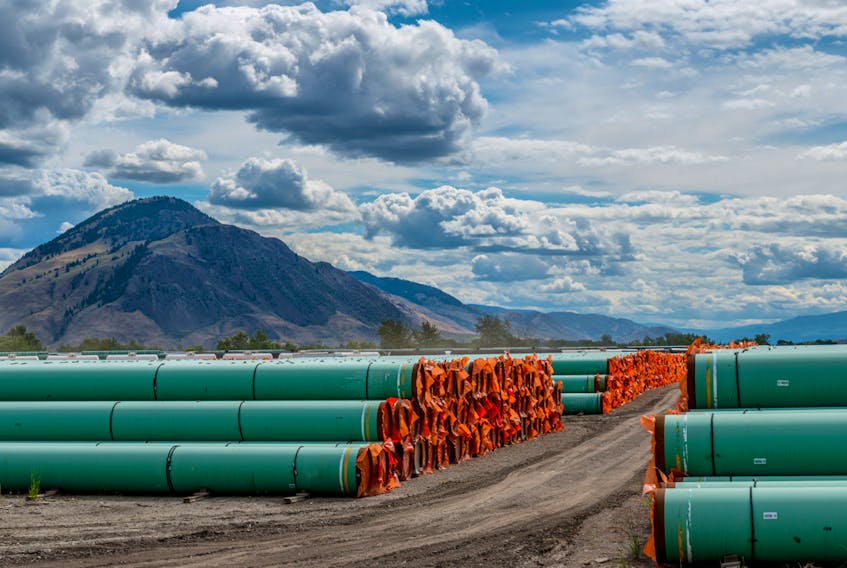OTTAWA, Ont. — The federal government has announced it is moving ahead with the Trans Mountain pipeline expansion, ending months of speculation over the development and offering some relief to the embattled oil and gas sector amid a years-long pipeline bottleneck.
“We have been assured by the company that they plan to begin construction this summer,” Prime Minister Justin Trudeau said of Trans Mountain Tuesday, just after his cabinet re-approved the project.
Trans Mountain Corporation, the crown company building the project, still needs to secure a number of regulatory permits before the expansion can be entirely completed, including certain permits for railway crossings and species protections, among other things.
The government did not provide an updated timeline on Tuesday, although past estimates suggest the project could be completed around 2022 or 2023.
The decision could go some way toward restoring investor confidence in Canada, which has waned amid a failure by the oil and gas industry to build major new export pipelines. Years of political and regulatory wrangling have delayed major infrastructure projects, including Trans Mountain, fuelling deep discontent in Western provinces. However, even before the announcement critics contended a green light for TMX would be too little, too late.
The decision underscores a balancing act by the Trudeau government to both support growth in the fossil fuels industry while also enforcing stricter environmental policies, including an economy-wide carbon tax. On Monday, the House of Commons passed a motion to declare a national climate emergency in Canada, then approved the pipeline a day later.
Some people “ will not be convinced by the arguments we put forward,” Trudeau said on the Liberal government’s balance between the economy and the environment. “ We accept that.”
Trudeau announced last summer that the federal government would buy the existing assets of the Trans Mountain pipeline for $4.4 billion, after the project’s private-sector owner, Kinder Morgan, threatened to scrap the project. Around the same time, a Federal Court of Appeal judge struck down an earlier approval of the expansion, forcing the government to repeat a portion of its consultations with First Nations communities affected by the pipeline, which carries oil to the B.C. coast for export.
Federal officials, under the direction of Minister of Natural Resources Amarjeet Sohi, have conducted months of talks with local communities along the pipeline’s path in an attempt to temper opposition to the project. Sohi met with 65 First Nations communities over Trans Mountain, and government officials remain in talks with some communities.
But in question period on Tuesday, Conservative MPs pressed the Liberal government on when construction would actually begin on the project, warning that added delays could lead to ballooning costs.
"The question is when will it get built," - Andrew Scheer.
Conservative leader Andrew Scheer said the cabinet decision “really gets us no closer” to completing Trans Mountain, claiming that Ottawa will now miss the crucial summer construction season, possibly leading to ballooning construction costs. Scheer criticized the initial decision to purchase the pipeline with taxpayers dollars.
“This sent a devastating message to the world, and to the business community, that the only way to get a project built in Canada is to have the government nationalize it,” he said.
Ratings agency Moody’s Investors Service, meanwhile, applauded the re-approval of the pipeline, but warned that the project “f aces significant political, regulatory, and judicial challenges, and ultimately we see a tremendous amount of execution risk up until the oil starts flowing.”
First Nations communities and some environmental groups have promised to delay the project through any means necessary, including legal challenges.
“No matter who approves it, this pipeline will not be built,” said Will George, a leader of Protect The Inlet and member of the Tsleil-Waututh Nation.
Advocacy group Environmental Defence said the move would make it impossible for the Trudeau government to meet its climate change targets.
“ This is irresponsible at a time when Canada is drifting further away from meeting our Paris climate commitment, and inconsistent with the climate emergency that was declared only yesterday,” it said in a statement Tuesday.
Any legal challenge is not expected to stall the project in the near term. A First Nation’s-led challenge against Enbridge’s Line 9 expansion pipeline, for example, received a ruling from the Supreme Court of Canada only after oil was already flowing through the line.
The expansion project would nearly triple the pipeline’s current capacity to 890,000 barrels of oil per day, bringing crude oil and other petroleum products from northern Alberta to a port near Vancouver.
It is expected to cost roughly $9.3 billion, according to documents filed last year by the pipeline’s former owner. However, analysts have warned that prolonged construction delays and a worker shortage in Western Canada could substantially raise the estimated costs of the pipeline. Some estimates put the expansion cost closer to $12 billion.
Fresh shipments of pipe have been making their way to storage yards along the proposed expansion route in recent weeks, according to a report by the Financial Post , suggesting construction firms are prepared to move ahead with the project.
The cabinet decision on Tuesday also comes as two other crucial conduits — the Line 3 and Keystone XL projects — languish in the U.S. regulatory and legal systems, leaving oil producers with few other options to get their product to market.
Earlier this month, a Minnesota court rejected Calgary-based Enbridge’s Line 3 replacement pipeline, further delaying a project not expected to come online before the end of 2020. The project would ship oil from northern Alberta to Wisconsin, and double current capacity to 760,000 barrels per day.
Meanwhile, construction will not begin this year on TC Energy’s Keystone XL pipeline, despite a favourable U.S. Court of Appeal ruling that allowed the company to move ahead with the project. The 830,000-barrel-per-day pipeline has been struck down by state-level regulators in Nebraska.
The Trans Mountain expansion could be getting underway amid a looming pipeline crunch in Alberta in coming years.
Analysts expect that increasing oilsands production next year could force a record number of barrels onto rail cars, prolonging financial pain in the oilpatch well before any new pipeline projects come online.
Canada could be shipping as much as 500,000 barrels per day of oil by rail car next year, according to a recent estimate by IHS CERA in Calgary, or roughly one out of every nine barrels produced in the country. In 2016 that ratio was closer to one in every 43 barrels produced in Canada.
A shortage of pipeline capacity caused Canadian heavy oil prices to plummet late last year, forcing producers to accept an average US$43 per barrel discount compared to U.S. benchmarks over the month of December.
Later this week, finance minister Bill Morneau will send letters to 129 Indigenous communities to begin discussions around offering First Nations a financial stake in the project.
• Email: [email protected] | Twitter: jesse_snyder
Copyright Postmedia Network Inc., 2019









